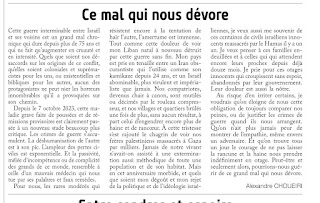Le puissant narratif occidental et israélien sur le conflit en Palestine vit ses derniers jours. Ce mur de justifications favorables à l’Etat d’israël, oblitérant la cause palestinienne, s’était déjà fissuré ces dernières années. Il est désormais tombé.
Pourtant, ce narratif était d’une puissance sidérante. Pendant des décennies, même ceux qui sympathisaient avec les Palestiniens et leur destin tragique, s’était laissés convaincre que tout cela était un peu la faute des dirigeants palestiniens et arabes. Qu’ils avaient fait tous les mauvais choix, qu’il auraient dû accepter le partage de leur terre
en 1948, que la majorité des Palestiniens était partie de son propre gré, et que les Arabes étaient violents, mauvais perdants, ou que les accords d’Oslo avaient échoué à cause du terrorisme. On nous disait non sans condescendance: « Les Palestiniens n’ont jamais raté une opportunité de rater une opportunité ». Et beaucoup y ont cru.
Les médias et les dirigeants occidentaux avaient ainsi mis sous le tapis l’aspect colonial et raciste d’un projet dont l’objectif pourtant ouvert était de déposséder le plus faible pour installer le plus fort avec des justifications d’ordre messianique ou pratique, comme celle de laver les horreurs de l’Holocauste en offrant un État au peuple Juif.
Certes, tout le monde n’y avait pas cru. Par exemple, le chanteur Renaud chantait seul dans les années 80:
« Où est la Palestine? Sous quelle botte étoilée, derrière quel barbelé, sous quel champ de ruines? (…) Combien de victimes? Combien de milliers d’enfants dans les décombres des camps deviendront combattants? »
Ses paroles, pourtant si clairvoyantes, étaient inaudibles devant le vacarme du narratif pro-israélien constamment alimenté de biais occidentaux et anti-arabes, ou depuis le 11 septembre 2001, d’islamophobie galopante.
En 2024, huit mois après le début de la guerre à Gaza, il ne reste plus grand chose de cette histoire écrite par des gagnants pour justifier l’injustifiable. Déjà, le refus de la solution à deux États affiché par la droite israélienne depuis les années 90 contrastait avec le mythe du sioniste pacifique constamment menacé par des hordes d’Arabes assoiffées de sang. Pire encore, la colonisation effrénée des terres palestiniennes occupées a transformé la Cisjordanie en une ribambelle de bantoustans encerclés par des colonies. Le fait que ces implantations illégales soient ouvertes aux Juifs du monde entier mais totalement interdites aux indigènes non-Juifs est pour le moins embarrassante pour ceux qui ont toujours dépeint Israël comme une démocratie éclairée. Ce régime d’apartheid est ainsi devenu un véritable cancer pour Israël, si virulent qu’il ne peut plus s’en défaire. Les images de jeunes colons arrogants, souvent nés en Occident, et venus déposséder les Palestiniens du peu qui leur reste, ont choqué le monde entier.
Aujourd’hui, si le Hamas est bien le mouvement obscurantiste qui n’hésite pas à recourir à des crimes de guerre et attaquer les civils, le monde entier a aussi enfin découvert que Netanyahu lui même avait ouvertement renforcé cet ennemi pour empêcher toute émergence d’un État Palestinien. Ensuite, une armée israélienne vengeresse a massacré des dizaines de milliers de civils sous des tonnes de bombes dans un génocide couvert par tous les médias, les ONG israéliennes et les réseaux sociaux. Tsahal qui s’auto-proclamait l’armée la plus morale du monde a entassé les déplacés dans des camps et affamé leurs enfants, dans l’espoir ouvertement affiché par plusieurs ministres israéliens de se débarrasser une fois pour toutes des Palestiniens de Gaza. On a brûlé des hôpitaux, tué des volontaires occidentaux, dynamité des universités et détruit les écoles et les mosquées. Le régime qui prétendait être une démocratie est devenu un paria tout aussi féroce mais autrement plus puissant que le Hamas.
Quand même de l’intérieur d’Israel, médias et ONG dénoncent ces crimes de guerre, quand des Juifs du monde entier manifestent contre cette vengeance en scandant “not in my name”, quand les dirigeants occidentaux se font huer à chaque discours, on comprend que le puissant narratif occidental pro-israélien est définitivement tombé. Preuve en est, des campements dans les meilleures universités américaines ont vu les élites de demain adopter la cause Palestinienne étouffée si longtemps. La Cour internationale de Justice a suivi le mouvement en émettant des mandats d’arrêt contre les dirigeants israéliens et ceux du Hamas, renvoyés dos à dos pour les horreurs qu’ils commettent.
En conclusion, et au delà de ce rééquilibrage médiatique, que faire de cet éternel Armageddon du Proche-Orient? Il n’y a jamais vraiment d’autre issue pérenne que les solutions basées sur la justice et les droits de l’homme. Le droit des Palestiniens à vivre chez eux sans barrages, spoliations et occupation. Le droit des Juifs Israéliens à vivre en sécurité mais sans être supérieurs aux non-Juifs. Pourquoi ces droits seraient-ils si profondément inconciliables?
IN ENGLISH
The Narrative Has Fallen
The powerful Western and Israeli narrative about the conflict in Palestine is living its last days. This wall of justifications favoring the State of Israel, obliterating the Palestinian cause, had already cracked in recent years. Now, it has liierally fallen apart.
Yet, this narrative was astoundingly powerful. For decades, even those who sympathized with the Palestinians and their tragic fate had been convinced that it was somewhat the fault of the Palestinian and Arab leaders. That they had made all the wrong choices, that they should have accepted the partition of their land in 1948, that the majority of Palestinians left of their own accord, and that the Arabs were violent, sore losers, or that the Oslo Accords failed because of terrorism. We were told, not without condescension: "The Palestinians never missed an opportunity to miss an opportunity." And many believed it.
Western media and leaders had thus swept under the rug the colonial and racist aspect of a project whose open goal was to dispossess the weaker to install the stronger, with messianic or practical justifications, such as washing off the horrors of the Holocaust by offering a state to the Jewish people.
Certainly, not everyone believed it. For example, the (French) singer Renaud sang alone in the 1980s:
"Where is Palestine? Under which star-studded boot, behind which barbed wire, under what field of ruins? (...) How many victims? How many thousands of children in the ruins of refugee camps will become fighters?"
His words, yet so insightful, were inaudible before the clamor of the pro-Israeli narrative constantly revived by Western and anti-Arab biases, or since September 11, 2001, by rampant Islamophobia.
In 2024, eight months after the beginning of the war in Gaza, little remains of this story written by the winners to justify the unjustifiable. Already, the rejection of the two-state solution displayed by the Israeli right since the 1990s contrasted with the myth of the peaceful Zionist constantly threatened by hordes of bloodthirsty Arabs. Worse, the rampant colonization of occupied Palestinian lands has turned the West Bank into a string of bantustans surrounded by settlements. The fact that these illegal settlements are open to Jews worldwide but completely forbidden to non-Jewish natives is at least embarrassing for those who have always depicted Israel as an enlightened democracy. This apartheid regime has thus become a real cancer for Israel, so virulent that it can no longer get rid of it. The images of arrogant young settlers, often born in the West, coming to dispossess the Palestinians of what little they have left, have shocked the entire world.
Today, while Hamas is indeed an obscurantist movement that does not hesitate to commit war crimes and attack civilians, the whole world has also finally discovered that Netanyahu himself had openly strengthened this enemy to prevent the emergence of a Palestinian state. Then, a vengeful Israeli army massacred tens of thousands of civilians under tons of bombs in a genocide covered by all media, Israeli NGOs, and social networks. The IDF, which proclaimed itself the most moral army in the world, packed the displaced into camps and starved their children, openly hoping, as several Israeli ministers have explained, to get rid of the Palestinians in Gaza once and for all. Hospitals were burned, Western volunteers killed, universities dynamited, and schools and mosques destroyed. The regime that claimed to be a democracy has become a pariah just as fierce but way more powerful than Hamas.
When even from within Israel, media and NGOs denounce these war crimes, when Jews worldwide protest against this vengeance shouting "not in my name," when Western leaders are booed at every speech, one understands that the powerful pro-Israeli Western narrative has definitively fallen. Proof of this is seen in the camps at the best American universities, where the elites of tomorrow have adopted the long forgotten Palestinian cause. The International Court of Justice followed suit by issuing arrest warrants against Israeli leaders and those of Hamas, equating them for the horrors they commit.
In conclusion, and beyond this media rebalancing, what to do with this eternal Armageddon of the Middle East? There are never really any other lasting solutions than those based on justice and human rights. The right of Palestinians to live at home without roadblocks, dispossession, and occupation. The right of Israeli Jews to live in security but without being superior to non-Jews. Why should these rights be so deeply irreconcilable?












